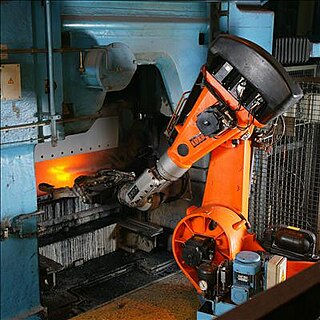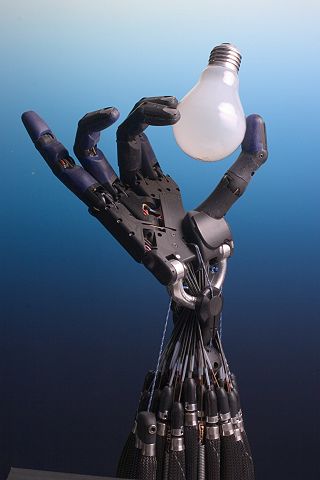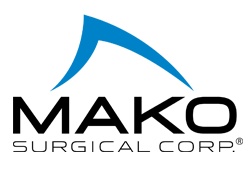
An industrial robot is a robot system used for manufacturing. Industrial robots are automated, programmable and capable of movement on three or more axes.

Hitachi, Ltd. is a Japanese multinational electronics company headquartered in Chiyoda, Tokyo. It traces its origins back to 1910 with the establishment of a subsidiary electrical machinery manufacturing plant by Namihei Odaira within the Kuhara Mining Plant Hitachi Mine in Hitachi, Ibaraki. It became independent from the Mining Plant in 1920.

ABB Ltd. is a Swedish-Swiss multinational corporation headquartered in Västerås, Sweden, and Zürich, Switzerland. The company was formed in 1988 when Sweden's Allmänna Svenska Elektriska Aktiebolaget (Asea) and Switzerland's Brown, Boveri & Cie merged to create Asea Brown Boveri, later simplified to the initials ABB. Both companies were established in the late 1800s and were major electrical equipment manufacturers, a business that ABB remains active in today. The company has also since expanded to robotics and automation technology.

Mentor Graphics Corporation was a US-based electronic design automation (EDA) multinational corporation for electrical engineering and electronics, headquartered in Wilsonville, Oregon. Founded in 1981, the company distributed products that assist in electronic design automation, simulation tools for analog mixed-signal design, VPN solutions, and fluid dynamics and heat transfer tools. The company leveraged Apollo Computer workstations to differentiate itself within the computer-aided engineering (CAE) market with its software and hardware.

Rockwell Automation, Inc. is an American provider of industrial automation and digital transformation technologies. Brands include Allen-Bradley, FactoryTalk software and LifecycleIQ Services.

FANUC is a Japanese group of companies that provide automation products and services such as robotics and computer numerical control wireless systems. These companies are principally FANUC Corporation of Japan, Fanuc America Corporation of Rochester Hills, Michigan, USA, and FANUC Europe Corporation S.A. of Luxembourg.

Robot welding is the use of mechanized programmable tools (robots), which completely automate a welding process by both performing the weld and handling the part. Processes such as gas metal arc welding, while often automated, are not necessarily equivalent to robot welding, since a human operator sometimes prepares the materials to be welded. Robot welding is commonly used for resistance spot welding and arc welding in high production applications, such as the automotive industry.

In robotics, a manipulator is a device used to manipulate materials without direct physical contact by the operator. The applications were originally for dealing with radioactive or biohazardous materials, using robotic arms, or they were used in inaccessible places. In more recent developments they have been used in diverse range of applications including welding automation, robotic surgery and in space. It is an arm-like mechanism that consists of a series of segments, usually sliding or jointed called cross-slides, which grasp and move objects with a number of degrees of freedom.

Laboratory automation is a multi-disciplinary strategy to research, develop, optimize and capitalize on technologies in the laboratory that enable new and improved processes. Laboratory automation professionals are academic, commercial and government researchers, scientists and engineers who conduct research and develop new technologies to increase productivity, elevate experimental data quality, reduce lab process cycle times, or enable experimentation that otherwise would be impossible.

An agricultural robot is a robot deployed for agricultural purposes. The main area of application of robots in agriculture today is at the harvesting stage. Emerging applications of robots or drones in agriculture include weed control, cloud seeding, planting seeds, harvesting, environmental monitoring and soil analysis. According to Verified Market Research, the agricultural robots market is expected to reach $11.58 billion by 2025.

Robotics is an interdisciplinary field that involves the design, construction, operation, and use of robots..
Robotics Design Inc. is a company that designs and builds modular robots, founded and incorporated in Montreal, Quebec, Canada, in 1997. The company produces mobile robots, robotic manipulators and manual arms as well as custom solutions using modular robotic technology. The company developed the BIXI bike dock, a public bike system, and the ADC, a deployable structure container for quick deployment of housing, hospitals and other buildings.
A mobile manipulator is a robot system built from a robotic manipulator arm mounted on a mobile platform. Such systems unite the advantages of mobile platforms and robotic manipulator arms and reduce their drawbacks. For instance, the mobile platform extends the workspace of the arm, whereas an arm offers several operational functionalities.

Comau is an Italian multinational company in the automation field based in Turin, Italy. It is a part of the automaker Stellantis. The company is present in 13 countries and employs 4,000 people.

A cobot, or collaborative robot, is a robot intended for direct human-robot interaction within a shared space, or where humans and robots are in close proximity. Cobot applications contrast with traditional industrial robot applications in which robots are isolated from human contact. Cobot safety may rely on lightweight construction materials, rounded edges, and inherent limitation of speed and force, or on sensors and software that ensure safe behavior.

Universal Robots is a Danish manufacturer of smaller flexible industrial collaborative robot arms (cobots), based in Odense, Denmark. Since 2015, the company has been owned by American automatic test equipment designer and manufacturer Teradyne.

MAKO Surgical Corp. was a publicly traded medical device company based in Florida. On September 25, 2013, the Board of Directors of Mako Surgical accepted a deal to be acquired by Stryker for $1.65B. The deal closed in December 2013.

Factory automation infrastructure describes the process of incorporating automation into the manufacturing environment and processing of input goods into final products.
Advanced Robotics for Manufacturing (ARM), also known as ARM Institute, is a consortium created in 2017 through a Department of Defense grant won by Carnegie Mellon University. ARM is structured as a public-private partnership and the Manufacturing USA Institutes, a network of 16 institutes dedicated to advancing technologies used in manufacturing. ARM was the 14th institute created and focuses on funding innovations in robotics and workforce development.
Vention is a Canadian automation company whose platform combines engineering software and plug-and-play automation components. It supplies parts, designs hardware, and provides e-commerce and 3-D computer-aided design (CAD) software. Vention is headquartered in Montreal, Canada, and has offices in Berlin, Germany, and Boston, Massachusetts.















